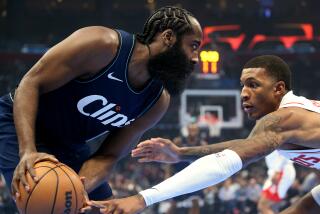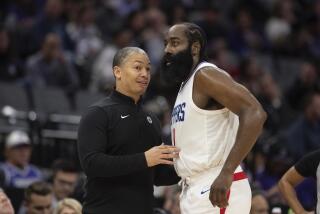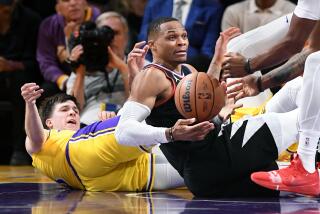Unseld Prescribes Return to Basics
- Share via
WASHINGTON — The Washington Bullets, looking more anxious than ever to reverse their early-season slide, have turned further inward to try to solve their problems.
They held a tense and intense two-hour practice at Bowie State University Wednesday, adding 30 minutes to the usual 1 1/2-hour session, that continued to stress the week-long tone of better defense.
What has happened so far is not a total defensive breakdown, but, as Coach Wes Unseld said, poor defensive play at times that has hurt. The Bullets have been beaten soundly in just one of their first five games, despite their 1-4 record. But the one time it occurred was in the last game, Saturday night in New York, giving the Bullets six days to work on what ails them before traveling to Boston on Friday.
With home-and-home games against the Celtics followed by three road games in four days next week and the 11-day Killer West Coast Swing at the start of December, the time for the Bullets to right themselves before things get out of hand is now. And with no one else to pound, the players worked hard on each other.
“It’s good for us,” guard Jeff Malone said, “to get some practice time in and go over the things we’re not doing well. We didn’t do a good job in New York and in previous games. When guys drive, we weren’t helping. So we’ve been doing a lot of basic, fundamental drills, to try to tighten it up.”
There’s little the undersized Bullets can do when bigger, stronger people post them up inside. But what’s rankled Unseld recently is not switching over quickly enough when the opposition has swung the ball around or gotten past the initial defender. That, in part, has led to slow starts. Washington has made its own share of runs, especially with its young group of Ledell Eackles, John Williams and Harvey Grant, but frequently has come up short in the closing minutes of play.
“You can come up with a (lack) of intensity; you can come up with a lot of reasons,” Unseld said. “But it’s very difficult when you keep digging yourself a hole to dig yourself out of it. One of the things we have talked about this week is trying to go out better. But we’ve talked about that before. We’re getting the shots. That hasn’t been the problem.”
Forward Bernard King said the defensive switches are less a matter of instinct than just going out and moving.
“I was watching Cleveland and Atlanta (Tuesday night),” he said. “Every time somebody drove to the basket, there would be someone there, or two people there to help. If we can save a basket by doing something that small, although it isn’t that small, at the end of the game you can get something positive from it.”
Grant, who has developed slowly but steadily, acknowledged some of his defensive difficulties early on have come in making the transition from collegiate switching and team defense, which is helped immensely by playing zones, to those made in the NBA.
“In college, (referees) don’t call zones,” he said. “In the pros they call zones if you’re not guarding anyone. You’ve got to get over to the next man, and if you don’t do that maybe the other team will have an open jumper or make an easy score. ... At the beginning of the season I didn’t know what to expect when they said ‘Harvey, take my man and rotate over here.’ I thought I could just guard anybody. But it doesn’t work that way.”
Offensively, if getting the shots hasn’t been the Bullets’ problem, making them has. Guard Jeff Malone is just 43.9 percent (40 of 91) from the floor and King has averaged 12.5 points in his last four games after getting 21 in the season opener.
Washington’s three point guards are struggling offensively, totaling 69 points in five games. Darrell Walker has been the best so far, averaging 10.8 points a game. But he has gone just 22 of 58 (37.9 percent) from the field.
More to Read
Go beyond the scoreboard
Get the latest on L.A.'s teams in the daily Sports Report newsletter.
You may occasionally receive promotional content from the Los Angeles Times.










